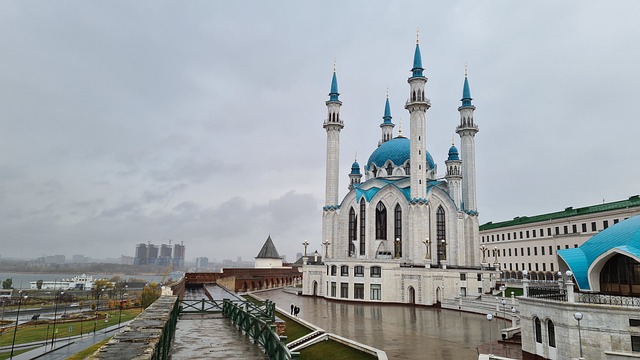
The BRICS Summit in Kazan: A New Era of Global Influence?
The 16th BRICS Summit, held in Kazan, Russia, was a pivotal event, signifying the growing influence of the group and the challenges it faces. As the world grapples with geopolitical shifts and economic uncertainty, the BRICS nations—Brazil, Russia, India, China, and South Africa—have emerged as a powerful force in international affairs.
The Kazan summit was not merely a gathering of leaders but a forum for forging a new path in international relations. It marked a significant departure from past meetings, aiming to move beyond vague political declarations and towards concrete decisions, as reported by Nezavisimaya Gazeta. Russia, the summit's chair, emphasized the importance of rejecting the outdated model of international relations dominated by Western dictates, paving the way for a multipolar world.
However, the summit also highlighted the internal challenges facing the BRICS group. Geopolitical tensions between member states—like the border disputes between India and China—pose a significant hurdle to the group's unity. The Kazan summit aimed to address these issues, recognizing the need for an internal mechanism to address tensions among member states.
The BRICS Agenda: A Focus on Development and Cooperation
“The BRICS Summit is one of the major international events of geopolitical importance. The scale of the event makes it clear that despite the West’s expectations, Russia’s international authority has not diminished, and Moscow has not found itself isolated.”
The BRICS nations are united by their shared commitment to development and economic cooperation. The summit focused on a range of issues vital to their members' interests, including trade, infrastructure development, technology transfer, and financial reforms.
BRICS Expansion: A New Chapter in Global Governance
The Kazan summit also discussed the potential expansion of the BRICS group. With many countries expressing interest in joining, the group has the potential to become a more formidable force in global governance. The summit explored new criteria for future BRICS activities, reflecting the changing global landscape.
The BRICS Summit: A Catalyst for Change
The BRICS Summit in Kazan was a momentous event, reflecting the group's growing influence and the challenges it faces. The summit highlighted the group's commitment to development, cooperation, and a multipolar world. However, it also underscored the need to address internal tensions and develop new models for multilateral cooperation.
The US's Middle East Diplomacy: A Balancing Act
While the BRICS Summit dominated global headlines, the US was actively engaged in its own efforts to shape the international landscape. US Secretary of State Antony Blinken embarked on a tour of the Middle East, seeking to resume talks on ending the conflict in the Gaza Strip, secure the release of Israeli hostages, and address the Lebanese conflict.
The Israeli-Lebanese Conflict: A Complex and Enduring Challenge
The Israeli-Lebanese conflict has been a source of regional instability for decades. The US's attempt to mediate the conflict is fraught with challenges, with Israel demanding control over Lebanon's border areas and airspace, a demand that Lebanon strongly opposes.
The Ukrainian War: A Widening Conflict
The conflict in Ukraine continues to escalate, with potential for wider involvement. Reports emerged that North Korean service members were allegedly engaged in combat against the Ukrainian army, prompting South Korea to consider sending weapons and military personnel to Ukraine.
The Korean Issue: A Potential Flashpoint
The involvement of North Korea in the Ukrainian conflict has heightened tensions on the Korean peninsula. South Korea's potential involvement in the conflict could further escalate tensions and increase the risk of a wider conflict.
Russia's Fertilizers: A Booming Export Market
As the global demand for fertilizers surges, Russia has experienced a significant increase in fertilizer exports. High demand and competitive prices are driving the growth of Russian exports, with key importers like the US, India, and Brazil turning to Russian supplies.
The Global Fertilizers Market: A Complex Landscape
The global fertilizers market is characterized by complex dynamics, influenced by domestic demand, international trade restrictions, and global factors like weather and agricultural policies. The growth of Russian fertilizers exports underscores the importance of this market in the global economy.
A Multipolar World: Challenges and Opportunities
The world is entering a new era of multipolarity, with emerging powers like the BRICS nations challenging the traditional dominance of Western powers. This new landscape presents both opportunities and challenges for global governance, requiring a more collaborative and inclusive approach to address shared challenges.
Table: BRICS Countries and their Economic Growth Rates
Country | 2023 GDP Growth Rate (%) | 2024 Projected GDP Growth Rate (%) |
Brazil | 2.9 | 2.5 |
Russia | 0.8 | 1.2 |
India | 7.0 | 7.5 |
China | 5.5 | 5.0 |
South Africa | 0.3 | 0.8 |
The Road Ahead: A World of Interdependence
The BRICS Summit in Kazan marks a significant moment in the global power dynamic. The group's growing influence and the challenges it faces highlight the need for a more cooperative and inclusive world order. As the world grapples with interconnected challenges, the BRICS nations are poised to play a crucial role in shaping the future of global governance.
Space for advertisement
INTERNATIONAL RELATIONS
Oct 27, 2024
BRICS Summit in Kazan: A New Era of Global Influence?
The BRICS summit in Kazan, Russia, is a significant event, showcasing the group's growing influence and the challenges it faces.

